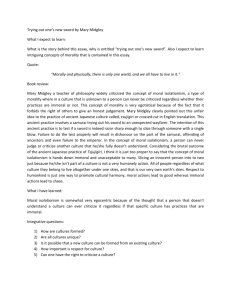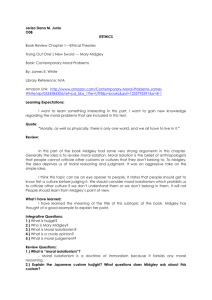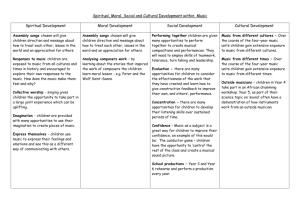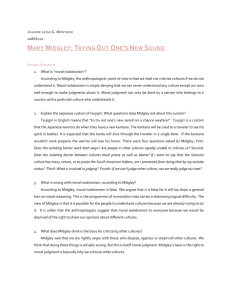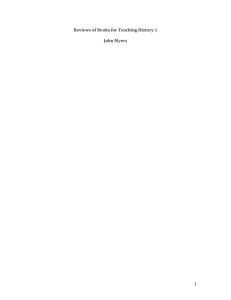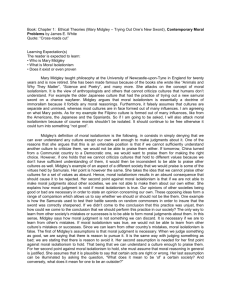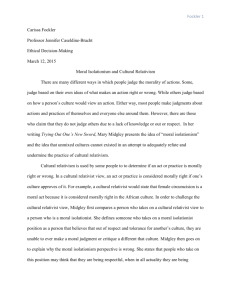Mary Midgley
advertisement
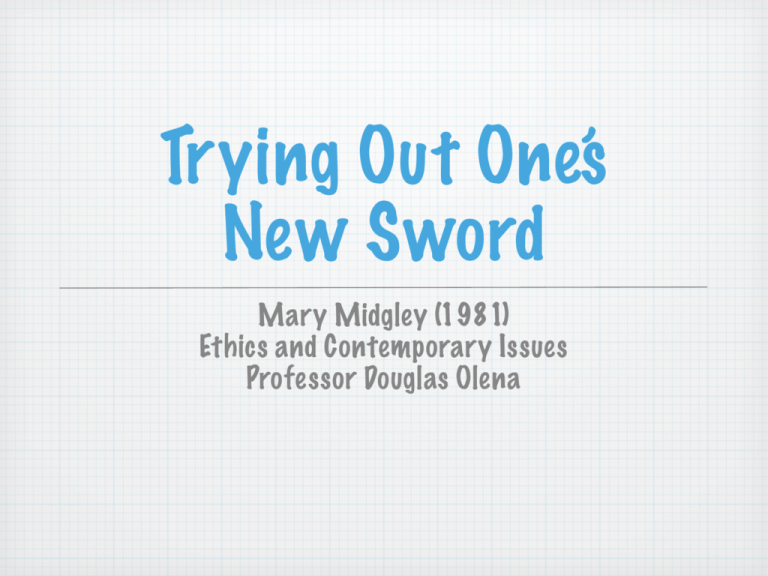
Trying Out One’s New Sword Mary Midgley (1981) Ethics and Contemporary Issues Professor Douglas Olena Moral Isolationism 27 Understanding other cultures is problematic. Midgley describes one way of dealing with this problem. “It consists in simply denying that we can ever understand any culture except our own well enough to make judgments about it.” “Respect and tolerance due from one system to another forbids us ever to take up a critical position to any other culture.” This is moral isolationism. Moral Isolationism 27 Midgley suggests that this view is “not forced on us” and “makes no sense at all.” People feel this attitude is respectful. However Midgley argues that in order to respect something we need to know something about it, and if we claim that we respect an entirely unintelligible culture, we must be mistaken. In order “to make a favorable judgment, however general and tentative,” we need to have knowledge. Example: tsujigiri 27 Tsujigiri, a practice of the Samurai. The word means “to try out one’s new sword on a chance wayfarer,” literally “crossroads-cut.” Example: tsujigiri 27 Midgley poses the problem this way: Because we can’t comprehend this practice, we are therefore unqualified to criticize it. We are unqualified because we are not members of that culture. We cannot criticize any other culture either on the same grounds. We are only qualified to criticize our own culture. Questions 1. 27 Does the isolating barrier work both ways? 2. 28 Does the isolating barrier block praise as well as blame? 3. What is involved in judging another culture? 4. If we can’t judge other cultures, can we really judge our own? Question 1 27 Does the isolating barrier work both ways? Are people of other cultures equally unable to criticize us? 28 Midgley thinks that outsiders can offer reasonable judgments. These judgments however can not be hasty. It takes some time to learn the culture and it may be that the insight of a foreigner is sharper than our own about our own culture. “Understanding has degrees.” It takes time to understand a foreign culture. Question 2 28 Does the isolating barrier bet ween cultures block praise as well as blame? “If I want to say Samurai culture has many virtues… am I prevented from doing that by my outside status?” “It is hardly possible that we could praise them effectively if we could not, in principle, criticize them.” “Certainly we may need to praise things we do not fully understand.” Can we judge bet ween strangers who are worth learning from and those who are not? Question 3 28 What is involved in judging another culture? “Judging simply means forming an opinion, and expressing it if it’s called for.” “We ought to avoid forming—and expressing—crude opinions.” (missionary example) “Moral isolationism forbids us to form any opinion on these matters” because we don’t understand that culture. Question 4 28 “If we can’t judge other cultures, can we really judge our own?” There is much about our own culture we don’t understand. We would lose not only the comments of our own people, but those of intelligent foreigners. Result of Moral Isolationism 28 “Moral isolationism would lay down a general ban on moral reasoning.” Conclusions 28 “The power of moral judgment is, in fact, not a luxury, not a per verse indulgence of the self-righteous. It is a necessity. When we judge some behavior, we take it as an example to aim at or avoid. In this vacuum, we could form no judgments on our own actions. Reasons for Moral Isolationism 28 “Our involvement with moral isolationism does not flow from apathy, but from a rather acute concern about human hypocrisy…” 29 “We are rightly angry at those who despise, oppress or steamroll other cultures.” “We think that doing these things is actually wrong.” But to say this is wrong is itself a moral judgment. Moral isolationism leaves us with a contradiction. Justifying a Culture 29 We are not really sceptics. We would justify the position of the Samurai internal to the beliefs of their culture. However this implies that it is possible to understand alien customs. “If we accept something as a serious moral truth about one culture, we can’t refuse to apply it… to other cultures as well. If we don’t do this, we can’t be said to be taking the other culture seriously. Smuggling in Modern Virtues 29 Somehow I am to think that the Samurai’s tsujigiri is acceptable in that culture. However it is suggested some modern form of consent is required as an interpretative overlay on the Samurai behavior. Consent gives me the license to universalize and reapply virtues I agree with to my culture or another. I am to think that the chance peasant willingly consents to this practice. But I can’t imagine either the peasant or Samurai would make any sense at all out of the concept of consent. Smuggling in Modern Virtues 29 We smuggle in our moral structure because it is the only thing that enables us to ask questions, the answers of which we can make sense of. More Conclusion 29 “The moral isolationist’s picture of separate, unmixable cultures is quite unreal.” 30 Except for the very smallest and most remote, all cultures are formed out of many streams. This implies that our own culture is multicultural already. The tiny insular societies studied by anthropologists mistakenly became the model by which our culture was judged. More Conclusion 30 Contact with these cultures and subsequent trade produced not only an understanding with them but groundwork to make these judgments. There is nothing to tell us, that given time, we couldn’t understand the Samurai in the same way.
